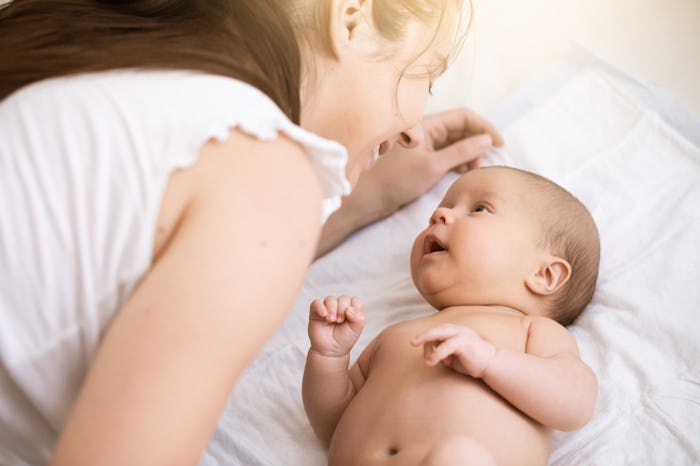News

Babies May Babble To Influence Their Parents' Speech Patterns, New Study Finds
Researchers have long known that the seemingly nonsensical babbling of a baby is actually one of the first steps toward language development. A new study, however, suggests that a baby's babbling may serve another purpose. Researchers at Cornell University think babies aren't just babbling, but are influencing their parents' language as a means of shaping their own learning environments.
Although studies have previously demonstrated that parents and caregivers can strengthen and encourage a baby's language development and skills by talking to them, recent research has found that babies may have more influence over the process than first thought. In fact, a study published in the September issue of The Journal of Child Language found that babies were able to influence how their parents spoke to them by babbling, resulting in parents unconsciously using more one-word replies and shorter sentences as well as fewer unique or complex words, all of which has been shown to help babies learn.
"Infants are actually shaping their own learning environments in ways that make learning easier to do," Steven Elmlinger, the study's lead author said in a statement, according to Science Daily. "We know that parents' speech influences how infants learn — that makes sense — and that infants' own motivations also change how they learn. But what hasn't been studied is the link between how infants can change the parents, or just change the learning environment as a whole."
And so Elmlinger and his team set out to examine the link. To do so, researchers observed and videotaped mother-infant pairs as they interacted with each other in a playroom stocked with toys, a toy box, and animal posters. Researchers worked with 30 mother-infant pairs in total and each pair was brought in separately for two 30-minute sessions spaced roughly 24 hours apart. The infants, all of whom ranged in age from roughly 9 to 10 months, were free to move about the room and explore or interact with objects as they wished. Both mom and child were fitted with wireless microphones so that any vocalizations could be recorded.
Ultimately, researchers found that parents responded to their child's babbling by simplifying the statistical and syntactic structure of their speech, using fewer unique words and more shorter utterances or even single-word utterances. They've argued that this suggests "a new form of influence of infants’ prelinguistic vocalizing on the ambient linguistic environment," according to Neuroscience News. Or, to put it more simply, that an infant's vocalizations may shape and create language learning opportunities by spurring their parents into simplified responses.
"We expected that mothers would respond more often when babbling was more mature, and they did," Michael Goldstein, an associate professor of psychology at Cornell told the Cornell Chronicle. This translated to what Goldstein called "more language-learning opportunities" for the baby, as the mother's response was more likely to be based around "simplified, learnable information" aka easy for baby to understand. "Thus, by varying the form and context of their vocalizations, infants influence maternal behavior and create social interactions that facilitate learning," Goldstein said, according to the Cornell Chronicle.
So while a baby's babbling might seem meaningless, it actually may be a huge part of what ultimately shapes their learning environment and drives their language development. And it's now clear parents can play a big role in this process.